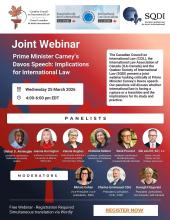Joint Webinar - Prime Minister Carney’s Davos Speech: Implications for International Law/Le discours de Davos du premier ministre Carney: quelles conséquences pour le droit international?
The News and Events category publishes the latest News and Events relating to International Economic Law relating to Africa and the Global South. Every week, Afronomicslaw.org receive the News and Events in their e-mail accounts. The News and Events published every week include conferences, major developments in the field of International Economic Law in Africa at the national, sub-regional and regional levels as well as relevant case law. News and Events with a Global South focus are also often included.
